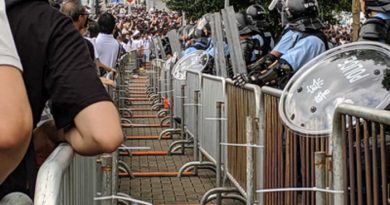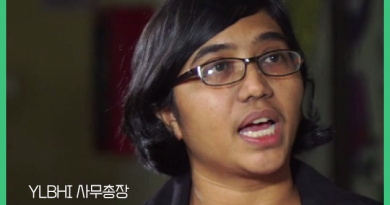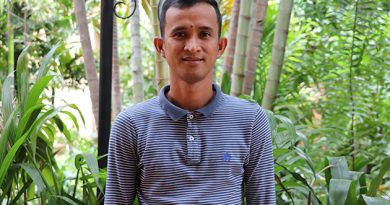Interview with Mr. Max Ediger, co-founder of Burma Issues
* Max Ediger was born in the USA, but has lived and worked in Asia since 1971. His work has taken him to Vietnam, Thailand and Hong Kong.
1. Please tell us about the history (from the British colonial period up to the present), culture and religion of Myanmar?
While it should have been no surprise that the military staged a coup against the elected government, it was perhaps not expected at this time by many observers. However, the history of the military, or Tatmadaw, should have been a warning to everyone that the military would not willingly give up their power over the politics and economy of the country but would be willing to allow limited “democracy” for a time while they were biding their time until they felt it necessary to reassert their full power, arrest Aung San Suu Kyi and other opposition leaders and place the country under a year-long state of emergency. A very small and limited slice of history might give some background to what is now taking place.
Burma became an interest to Britain in the early 1800s due to its location as a strategic trade route between India and China as well as the need to protect its interests in India. Trade between India and China passed through Burma providing an important source of income to the country although agriculture remained a more important economic vehicle. Britain was also very interested in the vast natural resources the country had, including jade, gold, teak etc.
In 1824, through a series of wars, Britain claimed control over the entire country of Burma and sent King Thibaw Min, whom they claimed was a tyrant, into exile. Burmese resistance against the British continued, but was not successful in ejecting the colonial power.
While the ethnic Burman, who are predominantly Buddhist, are the largest group in the country, there are nearly 135 other ethnic groups, mostly living along the borders. The Muslim Rohingya, making up about 2% of the total population of the country are not accepted as a part of Myanmar/Burma and are a stateless group living along the border with Bangladesh. No country seems to want to accept the Rohingya and they have sometimes been called the world’s most unwanted people. In the 1970s the Tatmadaw waged a campaign against the Rohingya driving large numbers into Bangladesh where they live in squalid refugee camps with little hope of returning to Myanmar/Burma. Many organizations consider the actions of the Tatmadaw against the Rohingya as an act of genocide.
Many of the other ethnic groups have a long history of resistance against the rule of the dominant Burman and have fiercely protected their land, culture, language and religions. This distrust of the ethnic minorities was noticed quickly by the British as they developed their grip over the land and economy.
To maintain their control, the British colonialists used a “divide and rule” strategy, pitting the Burman population, who were generally very strong nationalists, against the various ethnic groups who did not trust the Burman. The British found the ethnic groups to be more open to their presence and starting in the early 18th century many became Christian, especially among the Kachin, Chin and Kayin.
Because of this close relationship between the British and the ethnic groups, it was not difficult for the colonists to drive a deeper wedge between them and the dominant Burman population which was carrying out an independence movement. A stronger distrust and dislike developed between the two groups.
2. Could you tell us about the relatedness of the colonial legacy and the continuing military dictatorship? Do you think that the ongoing ethnic conflict is a root cause of the human rights violation and the military dictatorship? Can the Panlong agreement be the solution to the ethnic conflict?
After the end of World War II, a wave of national independence began to spread across Asia. Britain saw it necessary to give Burma its independence which they did in 1948. The ethnic groups, who had been strong allies of the British, expected to be given a major role in the newly emerging independent Burma. However, the British saw the military and political power base which General Aung San, commander of the Burma National Army, had developed as a more viable leader of the independent country.
On February 12, 1947, General Aung San met with many of the ethnic leaders in Panglong, Southern Shan State to try to resolve the long-standing conflict between the Burman and other ethnic groups. An agreement known as the Panglong Agreement was signed by leaders of the Shan, Chin, Kachin and General Aung San. One of the significant points was the agreement of full autonomy in internal administration of the Frontier Areas (border areas). This established the Union of Burma.
While the agreement received a lot of positive support, some of the ethnic groups were either ignored or felt they were simply not treated equally in the agreement. A few years later several armed struggles started against the Union with some groups calling for an independent country.
Before General Aung San could complete the process of independence for the country, he was assassinated on July 19, 1947. U Nu became the first prime minster and the country became a democracy. However, the distrust of the ethnic groups persisted. On 27 January 1949, only a few months after the assassination of General Aung San, the Karen rose up in rebellion against the democratic government. Very quickly other ethnic groups also rebelled. For them, the issue was not just having a democratically elected government, but it was rather the right to self-determination and full participation, which they felt they were not receiving under the U Nu government.
The divide and rule policy which the British used to maintain control of the country during the colonial period, had further enflamed distrust and anger between the Burman and the ethnic minorities. Some were now calling for an independent country rather than a federal system, believing that they could never be given equal participation in the present government. Saw Ba U Gyi, the first president of the Karen National Union, stated four principles for independence which most Karen hold on to even today.
- There shall be no surrender
- The recognition of the Karen State must be complete
- We shall retain our arms
- We shall decide our own political destiny
The 1947 constitution which declared Burma a democratic state with specific state rights, also gave some of the ethnic groups the right to withdraw from the union in ten years if they were not satisfied with their role in the country. There was growing interest in some of these ethnic groups to withdraw citing unequal participation. Prime Minister U Nu was unable to find a solution to these ethnic demands and on March 2, 1962, General Ne Win staged a coup. One reason for the coup was the fear among the military that under PM U Nu’s leadership, the union was becoming too unstable. The armed struggle of the ethnic groups intensified, and under General Ne Win, the country’s economy began to sink.
At independence, Burma was one of the best educated countries in Southeast Asia. Their universities and hospitals were coveted by other countries. By 1987, under Ne Win’s rule, Burma was given the unenviable status as a Least Developed Country (LDC) by the UN. Growing anger against General Ne Win and his dictatorial grip on the country intensified.
By August1988, anger was beginning to explode in the streets of the cities and the 8888 uprising went into full gear. The military allowed these demonstrations to go on for a short time, and then on 18 September, responded with violent force, killing thousands and driving many thousands more into the jungles to seek sanctuary with the armed ethnic groups.
During this time, Aung San Suu Kyi became a focus of the democratic struggle. Even though under house arrest, she was able to encourage and ignite the energy to keep pressure on the military. By 1990 the military was forced or organize an election and the National League for Democracy (NLD) won a resounding victory. However, the military managed to keep control of much of the political process and made it impossible for Aung San Suu Kyi to become Prime Minister. Still, she gave leadership to the NLD which continued to have significant influence on political events in the country.
3. Could you briefly share with us about the stories of Myanmar people’s struggles for democracy? Please tell us how we can express solidarity with the people in Myanmar.
The victory of the NLD during elections of 2015 was certainly something to celebrate. It was a great victory for the people of Burma. But it was also a very crucial time. Would the past acts of the military simply be set aside now with the hopes that they would be ready to work cooperatively for a process towards democracy? Or, would they bide their time, waiting for the right events to “merit” a military coup and reestablish themselves as the sole power in the country? Events suggest it was the latter. Instead of holding the military accountable for the atrocities they had carried out against the urban populations in 1988, and the murder, rape and destruction of indigenous lives and property for the past many decades and which continue to this day, the international community as well as many local NGOs seemed to take a “wait and see” attitude, using the space now available to develop social programs and build up the economy.
The February military coup put a stop to everything suggesting that the military never was serious about sharing power or control over the finances of the country. The “wait and see” attitude of much of civil society and the international community simply gave the military the time it wanted to regain their dominance.
They were, however met almost instantly with large protests from all sectors of the society including civil society, professionals, students and even some police. It was immediately clear that what appeared to have been a “wait and see” stance of civil society was actually the time they were busy preparing themselves in order to respond quickly and forcefully in response to the coup. There has been no end to their creativity and determination in their movement and there is also growing international support.
Joshua Carroll, in a February 13 article on Al Jazeera stated, “Amid the crackdown, protesters aim is to take away the coup leaders’ power by stopping all governance mechanisms from working. Starve the government of legitimacy and recognition; stop it from functioning by staging strikes; and cut off its sources of funding.” They are calling for the international community to support them in this strategy.
So, what conclusions can be drawn from this?
- 1) The struggle for democracy in Burma will not end until the military steps back. But even if the military does finally step back, a viable democracy can not grow in the country until the issues and demands of the ethnic groups are met and solved as this is central to the instability in the country. This also includes the situation of the Rohingya. As long as any group in the country feels alienated or unequal, a solid, lasting democracy cannot grow and the military can use that as an excuse to continue their iron grip. In the past they have made it clear that they believe the military is the only force able to keep peace and security in the country, and they intend to do that by using military force against the ethnic groups rather than negotiate with them.
- 2) The military will not back off. As in 1988, they may allow the people to be out in the streets for a short time and then suddenly take violent action against them, claiming they must do so in order to protect the Union. The one hope is that the international community will not just make statements, but will take action that confronts the military’s financial position because that is their weak point. Without control over the country’s funds, they cannot keep their military functioning with sufficient strength.
A very good example has been set by New Zealand which is suspending all high-level contact with Myanmar and imposing a travel ban on its military leaders following last week’s coup. The USA has now also developed a similar approach. This kind of action, rather than broad sanctions or boycotts which could have a very disastrous effect on the population already having to deal with economic struggle due to COVID-19, is directed directly at the military and can be the kind of international threat which might cause them to step back.
- 3) A lasting democracy also requires that the military be held accountable, not just for the recent coup, but for the harassment and murder of indigenous people around the border who have suffered for many decades already, including the Rohingya. If they are not held accountable for these atrocities, they will not give up their grip over the country and an end to the civil wars still raging will not end.
- 4) The people of Burma will not give up their struggle, but will continue it with great determination as well as much creativity. Their experience since the uprising in 1988 has taught them much and they are now a formidable force confronting the military. Since the election in 2015 when the opposition NLD won a decisive victory, the young generation has experienced more freedom, they have had more contact with the outside world and they have had opportunity to meet international groups for exchange and training. They are a significant force to deal with and a violent military response to them might force them to draw back for a time, but they will not give up their dream for democracy.
- 5) Indigenous groups throughout the country will also continue their struggle for self-determination and this can only end when the military is held accountable for their violence against the ethnic minorities and when the ethnic minorities have sufficient trust and confidence in the government and people of Burma that their lands, villages, cultures, languages and histories will be respected and protected. They must also have equal participation in the governing of the country.
For further reading:
https://www.britannica.com/place/Myanmar/The-emergence-of-nationalism
https://www.voanews.com/east-asia-pacific/myanmar-coup-piles-pressure-militarys-business-empire
https://www.voanews.com/east-asia-pacific/anger-over-arrests-myanmar-anti-coup-protests




